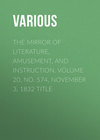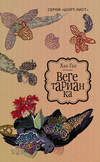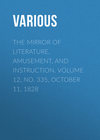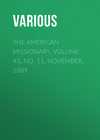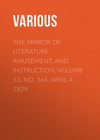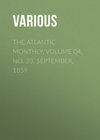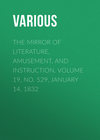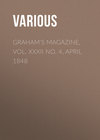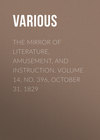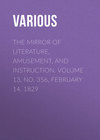Czytaj książkę: «The Mirror of Literature, Amusement, and Instruction. Volume 20, No. 574, November 3, 1832 Title», strona 4
THE TOPOGRAPHER

LESTINGHAM CHURCH
(From a Correspondent.)
Lestingham, which is supposed to signify lasting-home, is a village near Kirkby Moorside, Yorkshire, the scene of Buckingham's death, so caricatured by Pope in his Dunciad. It is remarkable on account of its church, which is a most interesting edifice to the antiquary, exhibiting a true specimen of Saxon architecture. The east end terminates in a semicircular recess for the altar, resembling the tribune of the Roman basilica. It was here that Cedd, bishop of the East Saxons, or London, founded a monastery for Benedictines, about the year 648, or, some say, 655. The church of Lestingham was the first which was built in this district, or the first of which we have any account. It was originally constructed of wood, and it was not till many years after that a stone one was erected.
Cedd was a Saxon missionary, educated at the monastery of Lindisfarne, now Holy Island, not far from Bamburgh, the capital of Bernicia. Ethelwald, king of Deira, knowing Cedd to be a man of real piety, desired him to accept some land for the building of a monastery, at which the king might attend to pray. Cedd availed himself of the proposal, and chose Lestingham. Having fixed on the spot for the site of the sanctuary, he resolved to consecrate it by fasting and prayer all the Lent; eating nothing except on the Lord's day, until evening; and then only a little bread, an egg, and a small quantity of milk diluted with water; he then began the building. He established in it the same discipline observed at Lindisfarne. Cedd governed his diocese many years; and died of a plague, when on a visit to his favourite monastery at Lindisfarne, where he had been ordained bishop by Finan; he was interred here, 664, but his remains were taken up, and re-interred in the present church, on the right side of the altar.

The present Saxon church contains many relics of antiquity; as painted glass, ancient inscriptions, &c.; but the most remarkable feature of is interior is the celebrated crypt, or vault, formerly used as a depository for the venerated relics of canonized prelates. At the east end of this subterraneous retreat, from the window through which the light faintly gleams, the scene is interesting to astonishment. Here you perceive the massy arches ranged in perspective on huge cylindrical pillars, with variously sculptured capitals, each differing from the other, and all in the real Saxon style; to this add the groined roof, and the stairs at the west end, leading up into the church, enveloped in a luminous obscurity, from the scanty light admitted by the window at the east end. From the account given by Venerable Bede, that the body of Cedd was interred on the right of the altar, we may suppose that the crypt was built after the erection of the church, though the time cannot be ascertained.
About fifty years ago, the remaining part of the venerable monastery, founded by Cedd, was razed, and its walls, hallowed by the dust of the holy brotherhood, furnished materials for building. The Rev. W. Ellis, the then incumbent, whose indignation, at the circumstance, was unbounded, wrote some Latin verses on the subject; but they have been lost in the stream of time, and, like the ashes of the hand that wrote them, cannot be found.
The late Mr. Jackson, R.A., was a native of the village of Lestingham; and, with feelings of regard for the land of his childhood, he proposed to execute a painting, as an altar-piece for the church. His Grace the archbishop of York and the Rev. F. Wrangham, were consulted on the subject, and gave it their approval; but, we believe, the meritorious artist died before he had finished the painting.
NEW BOOKS
WILD SPORTS OF THE WEST
This book is a grievous failure—that is, if the merits of books are to be adjudged with their titles. The writer is the author of Stories of Waterloo, from whom better things might have been expected. He has taken for his model, Mr. Lloyd's really excellent Field Sports of the North of Europe; but he has woefully missed his mark. The title of the work before us is equivocal: a reader might as reasonably expect the Sports of the Western World, as adventures in Ireland, such as make up the present volumes. What we principally complain of is the paucity of Sports among their contents. It is true that the title also promises Legendary Tales and Local Sketches, but here they are the substance, and the Wild Sports mere shadow. We have too little of "the goodly rivers," "all sorts of fish," "the sweet islands and goodly lakes, like little inland seas," "of the most beautiful and sweet countrey," as Spenser phrases it in the author's title-page; and there is not so much as the author promises in his preface, of shooting the wild moors and fishing the waters, of days spent by "fell and flood," and light and joyous nights in mountain bivouacs and moorland huts. There is too much hearsay, and storytelling not to the purpose, and trifling gossip of "exquisite potatoes" and "rascally sherry"—details which would disgrace a half-crown guide book, and ought certainly not to be set forth with spaced large type in hotpressed octavos at a costly rate. Nevertheless, the work may suit club-room tables and circulating libraries, though it will not be allowed place for vivid display of Wild Sports. We quote two extracts—one, a narrative which the author knows to be substantially true; the other, relating to the attack of eagles, (though we omit the oft-told tale of the peasant attempting to rob an eagle's nest, and his hair turning white with fright):—
The Blind Seal
About forty years ago a young seal was taken in Clew Bay, and domesticated in the kitchen of a gentleman whose house was situated on the sea-shore. It grew apace, became familiar with the servants, and attached to the house and family; its habits were innocent and gentle, it played with the children, came at its master's call, and, as the old man described him to me, was "fond as a dog, and playful as a kitten."
Daily the seal went out to fish, and after providing for his own wants, frequently brought in a salmon or turbot to his master. His delight in summer was to bask in the sun, and in winter to lie before the fire, or, if permitted, creep into the large oven, which at that time formed the regular appendage of an Irish kitchen.
For four years the seal had been thus domesticated, when, unfortunately, a disease, called in this country the crippawn—a kind of paralytic affection of the limbs which generally ends fatally—attacked some black cattle belonging to the master of the house; some died others became infected, and the customary cure produced by changing them to drier pasture failed. A wise woman was consulted, and the hag assured the credulous owner, that the mortality among his cows was occasioned by his retaining an unclean beast about his habitation—the harmless and amusing seal. It must be made away with directly, or the crippawn would continue, and her charms be unequal to avert the malady. The superstitious wretch consented to the hag's proposal; the seal was put on board a boat, carried out beyond Clare Island, and there committed to the deep, to manage for himself as he best could. The boat returned, the family retired to rest, and next morning a servant awakened her master to tell him that the seal was quietly sleeping in the oven. The poor animal over night came back to his beloved home, crept through an open window, and took possession of his favourite resting-place.
Next morning another cow was reported to be unwell. The seal must now be finally removed; a Galway fishing-boat was leaving Westport on her return home, and the master undertook to carry off the seal, and not put him overboard until he had gone leagues beyond Innis Boffin. It was done—a day and night passed; the second evening closed—the servant was raking the fire for the night—something scratched gently at the door—it was of course the house-dog–she opened it, and in came the seal! Wearied with his long and unusual voyage, he testified by a peculiar cry, expressive of pleasure, his delight to find himself at home, then stretching himself before the glowing embers of the hearth he fell into a deep sleep.
The master of the house was immediately apprized of this unexpected and unwelcome visit. In the exigency, the beldame was awakened and consulted; she averred that it was always unlucky to kill a seal, but suggested that the animal should be deprived of sight, and a third time carried out to sea. To this hellish proposition the besotted wretch who owned the house consented, and the affectionate and confiding creature was cruelly robbed of sight, on that hearth for which he had resigned his native element! Next morning, writhing in agony, the mutilated seal was embarked, taken outside Clare Island, and for the last time committed to the waves.
A week passed over, and things became worse instead of better; the cattle of the truculent wretch died fast, and the infernal hag gave him the pleasurable tidings that her arts were useless, and that the destructive visitation upon his cattle exceeded her skill and cure.
On the eighth night after the seal had been devoted to the Atlantic, it blew tremendously. In the pauses of the storm a wailing noise at times was faintly heard at the door; the servants, who slept in the kitchen, concluded that the Banshee came to forewarn them of an approaching death, and buried their heads in the bed-coverings. When morning broke the door was opened—the seal was there lying dead upon the threshold!"
"Stop, Julius!" I exclaimed, "give me a moment's time to curse all concerned in this barbarism."
"Be patient, Frank," said my cousin, "the finale will probably save you that trouble. The skeleton of the once plump animal—for, poor beast, it perished from hunger, being incapacitated from blindness to procure its customary food—was buried in a sand-hill, and from that moment misfortunes followed the abettors and perpetrators of this inhuman deed. The detestable hag, who had denounced the inoffensive seal, was, within a twelvemonth, hanged for murdering the illegitimate offspring of her own daughter. Every thing about this devoted house melted away—sheep rotted, cattle died, 'and blighted was the corn.' Of several children none reached maturity, and the savage proprietor survived every thing he loved or cared for. He died blind and miserable.
"There is not a stone of that accursed building standing upon another. The property has passed to a family of a different name, and the series of incessant calamity which pursued all concerned in this cruel deed is as romantic as true."
Visit to the Eagle's Cliff, in Inniskea
We ascended the hill (while the crew were clearing and baiting their spillets) in the vague hope of getting a shot at these predatory birds, of whose spoliations we had heard so much on the preceding evening.
On reaching the bottom of the rock, in whose face the aërie stands, we discovered that the old birds were absent, and as the nest was formed in a deep fissure, we could not ascertain its situation exactly. But that the eagles' dwelling was above us was evident, enough: the base of the cliff was strewn with bones and feathers, and the accumulation of both was extraordinary. The bones of rabbits, hares, and domestic fowls, were most numerous, but those of smaller game, and various sorts of fish, were visible among the heap.
Many attempts are annually made to destroy this predatory family. It is impossible to rob the nest. Situated two hundred feet above the base of the rock, it is of course unapproachable from below, and as the cliffs beetle over it frightfully, to assail it from above would be a hazardous essay. An enterprising peasant, some years since, was let down by a rope and basket,—but he was fiercely attacked by the old birds, and the basket nearly overturned. Fortunately the cord was strong and had sufficient length to allow his being lowered rapidly, or he would have undoubtedly sustained some bodily injury from the wings and talons of those enraged and savage birds.
The village of Dugurth suffers heavily from its unfortunate proximity to the aërie. When the wind blows from a favourable point, the eagle in the grey of morning sweeps through the cabins, and never fails in carrying off some prey.
To black fowls eagles appear particularly attached, and the villagers avoid as much as possible rearing birds of that colour.
A few days before, one of the coast-guard, alarmed by the cries of a boy, rushed from the watch-house; the eagle had taken up a black hen, and, as he passed within a few yards, the man flung his cap at him. The eagle dropped the bird; it was quite dead, however, the talons having shattered the back-bone. The villagers say (with what truth I know not) that turkeys are never taken.
That the eagle is extremely destructive to fish, and particularly so to salmon, many circumstances would prove. They are constantly discovered watching the fords in the spawning season, and are seen to seize and carry off the fish. One curious anecdote I heard from my friend the priest. Some years since a herdsman, on a very sultry day in July, while looking for a missing sheep, observed an eagle posted on a bank that overhung a pool. Presently the bird stooped and seized a salmon, and a violent struggle ensued; when the herd reached the spot, he found the eagle pulled under water by the strength of the fish, and the calmness of the day, joined to drenched plumage, rendered him unable to extricate himself. With a stone the peasant broke the eagle's pinion, and actually secured the spoiler and his victim, for he found the salmon dying in his grasp.
When shooting on Lord Sligo's mountains, near the Killeries, I heard many particulars of the eagle's habit and history from a grey-haired peasant who had passed a long life in these wilds. The scarcity of hares, which here were once abundant, he attributed to the rapacity of those birds; and he affirmed, that when in pursuit of these animals, the eagle evinced a degree of intelligence that appeared extraordinary. They coursed the hares, he said, with great judgment and certain success; one bird was the active follower, while the other remained in reserve, at the distance of forty or fifty yards. If the hare, by a sudden turn, freed himself from his most pressing enemy, the second bird instantly took up the chase, and thus prevented the victim from having a moment's respite.
